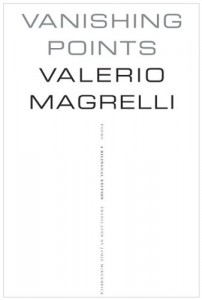Poetry Review: Valerio Magrelli’s “Vanishing Points”
The “I” in his poems isn’t Magrelli. The personal in his poems is political and philosophical and never prurient . . . Magrelli’s is a reserved, critical intelligence, and his poems do not issue from a position of knowledge but rather from a doubt that stands, and dances, slowly on a profound respect for ambiguity.
Vanishing Points. Poems by Valerio Magrelli. Translated from the Italian by Jamie McKendrick. Farrar Straus Giroux, 233 pages, $27.
By Daniel Bosch
Last year FSG quietly published a selection of poems by Valerio Magrelli, an Italian poet, born in 1957, who is not yet well known in the United States.
In Vanishing Points, a bilingual edition, you will see work from all of the books Magrelli has published in Italian since 1980. I want to encourage you to get to know and to savor Magrelli’s poems, so I’ll briefly discuss five examples, in chronological order below, before I close with a few words on the translations. I believe that if you have been following crowded, self-clamoring American poetry, it will be obvious immediately, from the five poems below alone—and I make no assertion that these five are the best in Vanishing Points—that you will want to read Magrelli.
That is because his work participates in literature. It’s not in what we call on this side of the pond “creative writing.” The “I” in his poems isn’t Magrelli. The personal in his poems is political, and philosophical and never prurient. He’s a professor, and I hope you’ll forgive him. (His latest critical book is a study of single poem by Charles Baudelaire!) But smart as he is, Magrelli’s is a reserved, critical intelligence, and his poems do not issue from a position of knowledge but rather from a doubt that stands, and dances, slowly on a profound respect for ambiguity.
A Magrelli poem is short. It is quiet, sometimes meditative, and often metaphysical. Its lines are free verse, almost without exception, but Magrelli has a wonderful ear, and it would take willful misreading to hear his richly musical, deftly cut Italian as prose. You may notice as you read through the samples that follow, as I have noticed reading all of Vanishing Points, that Magrelli neither improves over time nor strains for aestheticizing effects. Because his work is founded on wit, not narrative, and because he trusts his medium, Magrelli proceeds, calmly, thoughtfully, confidently, as if he knows what he is about, to create (in Marianne Moore’s words) “imaginary gardens with real toads in them.”
Let’s begin with an untitled poem from Magrelli’s first book, Ora Serrata Retinae (1980):
There are some books that serve to unveil others,
but writing’s usually about spiriting away,
subtracting certain things from reality
whose loss will then be felt.
This maieutics of the sign
makes them manifest: by their travail
we learn to see them.
I know. Don’t say it. You like this poem, but you are very concerned about line five. (I told you there were toads in a Magrelli garden.) I was concerned, too! But “maieutics of the sign” (which refers to a dialectical struggle to give birth to ideas-in-the-world) is the only example of academic jargon in Vanishing Points! And doesn’t the surprising, simple truth of this poem overcome its single flaw? I said that Magrelli doesn’t improve, but perhaps, like me, you’ll consider this early slip into academic jargon to be one of the vanishing points to which the title of this book refers, a hint at the horizon of a vocabulary that remains in reserve, a suggestion of a path Magrelli might have taken but—thankfully—did not.
Is poetry what is spirited away by the moving company en route? Consider “The Mover” from Esercizi de Tiptologia (1992):
The Mover
What is translation? On a platter
A poet’s pale and glaring head . . .
—Vladimir NabokovThe weighed-down mover
who empties my room
does the same work as me.
I, too, arrange house moves
for words, for words
that aren’t mine,
and lay hands on
what’s beyond me
without quite figuring out
what it is I’m moving.
I am moving myself,
translating the past into a present
that travels sealed
and folded in pages
or in boxes labeled FRAGILE,
about whose contents I can only guess.
And this is the future, the shuttle
shifting back and forth, the metaphor,
laborer time, time with its hither zone,
its middle west or east,
transfer and trope,
the moving firm.
How is it that it took Magrelli to discovery that to have to have poets is like having to hire movers—strangers who take what is ours and transfer it to new rooms. (Rooms are “stanzas” in Italian. And I’m reminded that in Greece, moving vans frequently have METAPHOR lettered on their tin or aluminum siding.) How heavy those boxes are, and how strangely light! In “The Mover,” poetry is achieved with utter clarity, but the poem’s meanings refuse to sit still, for a poem must move. This would have been a good poem if Magrelli had ended it at “about whose contents I can only guess.” That he took it just this much further makes it, like “La Poesia,” below, and a poem worth rereading, because it is a poem that has at heart our undoing — by rereading. Did you know you needed instruction in how to read a newspaper?
Poetry
Poems always have to be reread,
read, reread, read again, recharged;
every reading energizes them—
they’re machines to recharge sense,
and meanings gather in them, a buzz
of particles that lie in wait,
withheld sighs, clicking and ticking
inside the Trojan Horse.
Now don’t jump to any conclusions: not all of Magrelli’s work refers to writing! (Though if it referred to writing as lively and clear as this, would that be such a bad thing?) Some of the poems in Vanishing Points are rooted in the domestic, as in this alba, or morning song, from Disturba del Sistema Binario (2006):
The Shadow
Sunday morning
I’m woken by the voice
of my daughter, who, shouting,
asks her brother
if it’s true the Bomb
when it explodes
leaves the shadow
of man on the wall.
(Not of “a man”
but “of man” she says.) He
agrees that it does.
I turn in my bed.
Let us suppose that “The Shadow” is essentially a “found poem.” I appreciate how Magrelli is wise enough to keep his fingers mostly off of it, to let this trivial, this ironical poetry “from the mouths of babes” ramify. “The Shadow” knows not every good thing is the result of labor and that sometimes the poet’s job is to listen, to record, and to turn in bed. “The Shadow” is no less strong a wake-up call for the honesty of its speaker’s unwillingness to address, right now, the shadow cast by the Bomb.
“The Calm Surface,” also from Disruptions of the Binary System (2006), is an ars poetica that would make a damn good tag-team wrestling partner for Robert Frost’s “Neither Out Far Nor In Deep.” With characteristic restraint and simplicity, Magrelli’s short poem refracts both the necessity and the fragility of calm surfaces and their dependence on distance from what lurks:
The Calm Surface
The Word skims the water and tots up
as many as a dozen leaps and bounces.
Hat’s off! But what does the calm surface
know of the dark below?
I suspect that you can’t get into English a line as beautiful as Magrelli’s finale here—”sottosante, la quieta superficie?”—which ends by repeating the title and so ties a tight knot. Nonetheless I find “know of the dark below” simple, clear, and philosophically resonant.
Magrelli did not write a word of Vanishing Points with the intention of reaching American readers, and perhaps that’s part of why I find his work so wonderful. His is a poetry of lightness and gravity, of scope and focus. There is an author and a sensibility, but we neither trip over his muddy shoes at the threshold of his work nor smell his cigarettes in our kitchen the next morning. In Vanishing Points a brilliant mind names intellectual and emotional stakes and problems, but Magrelli isn’t pretending to have resolved them. He’s just made the words and lines that bring them alive, so that we can reread them.
In poet Jamie McKendrick, Magrelli has met his match. McKendrick’s “A Note on the Translation” is wise, concise, and eloquent. He positions his work between the “appropriation, or, worse, expropriation” of Robert Lowell’s Imitations, the triumphs of which “tend to be most admired by those with little knowledge of the languages and the poems (Lowell) was ‘imitating’,” and rigor of Elizabeth Bishop, who practiced, as a translator, “a severe adherence to the original that doesn’t sacrifice vitality and formal invention.” He gives himself a lot of room, and he uses it. Reading the vast majority of the translations in Vanishing Points, one turns to the Italian on the facing page and finds that McKendrick has achieved a remarkable fidelity. The texture of his English, though it cannot sound like Italian, very often mimics the texture of the original, whether that texture is loose and evokes Magrelli’s sense of the freedoms available in his line, or whether the text is densely rhymed internally, or woven from near-anagrams. I find that the shapes of Magrelli’s lines and stanzas, by and large, are not only preserved in McKendrick’s versions but honored for the part they play in conveying Magrelli’s carefully measured yet ambiguous, semantic charges. The untitled poem that begins “That matter engenders contagion…” is a superb example of McKendrick at his most faithful and responsive approach.
But as McKendrick emphasizes, he has not been “consistent with any theory.” Sometimes his translations have entailed a “labor intensive, counter intuitive maneuver,” as when he wrestled “Parlano” into irregular end rhymes. Here the ingenuity McKendrick of his English version—as good a poem as it is—comes at the cost of a corresponding disregard for Magrelli’s lineation, as when a gorgeously simple passage like
…luminoso,
tenero come foss la membrana de un timpano
becomes
—its luminous membrane
tender as a drumskin
or an eardrum.
in which McKendrick beats to death the pun in the Italian “timpano.” Likewise in his “Potential Energy,” McKendrick gives an untitled poem a title, makes it five lines longer than the original, and puts an em-dash encrusted belt around its rather high waist to demarcate an interjection Magrelli didn’t make, even if it does reinforce the English version’s strong, central metaphor. This translator’s ability to skin cats is as supple as Magrelli’s ability to make them. As McKendrick tells us, that translator works best who extends his own voice while coping with his own limitations as best he can.


